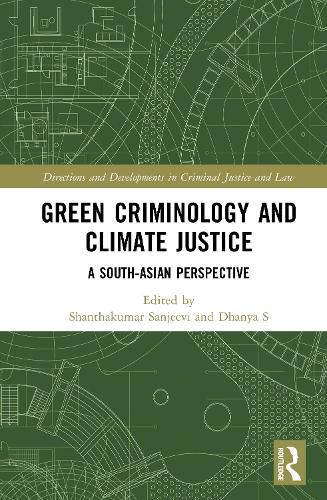Readings Newsletter
Become a Readings Member to make your shopping experience even easier.
Sign in or sign up for free!
You’re not far away from qualifying for FREE standard shipping within Australia
You’ve qualified for FREE standard shipping within Australia
The cart is loading…






This book investigates the jurisdictions and strategies adopted by corporations, governments, and individuals in dealing with Green Criminology. It provides readers with an in-depth understanding of the issues contributing to climate change, the challenges caused, and the best practices for mitigation adopted by the selected countries.
The book brings together experts on Green Criminology and Climate Justice from the South Asian Region, comprising both theoretical and empirical chapters. It specifically deals with the theoretical analyses of the role of mens rea and negligence in green criminology; non-speciest views on Green Criminology; green crimes such as illegal trade of wildlife, illegal waste dumping, and ecocide and carbon criminals; transnational green crimes; the role of corporations in green crimes; victims of green crimes and the mitigating strategies. The book focuses on overlapping Environmental Law and Policy with Corporate and Governmental Crimes against the environment, and Environmental Justice Movements, all based on Criminological perspectives.
Acting as a gateway of knowledge for students and academicians looking to delve deeper into the constantly evolving domain of Green Criminology, this book will be of great interest to those researching both Criminology and Law, as well as South Asian Studies more broadly.
$9.00 standard shipping within Australia
FREE standard shipping within Australia for orders over $100.00
Express & International shipping calculated at checkout
This book investigates the jurisdictions and strategies adopted by corporations, governments, and individuals in dealing with Green Criminology. It provides readers with an in-depth understanding of the issues contributing to climate change, the challenges caused, and the best practices for mitigation adopted by the selected countries.
The book brings together experts on Green Criminology and Climate Justice from the South Asian Region, comprising both theoretical and empirical chapters. It specifically deals with the theoretical analyses of the role of mens rea and negligence in green criminology; non-speciest views on Green Criminology; green crimes such as illegal trade of wildlife, illegal waste dumping, and ecocide and carbon criminals; transnational green crimes; the role of corporations in green crimes; victims of green crimes and the mitigating strategies. The book focuses on overlapping Environmental Law and Policy with Corporate and Governmental Crimes against the environment, and Environmental Justice Movements, all based on Criminological perspectives.
Acting as a gateway of knowledge for students and academicians looking to delve deeper into the constantly evolving domain of Green Criminology, this book will be of great interest to those researching both Criminology and Law, as well as South Asian Studies more broadly.